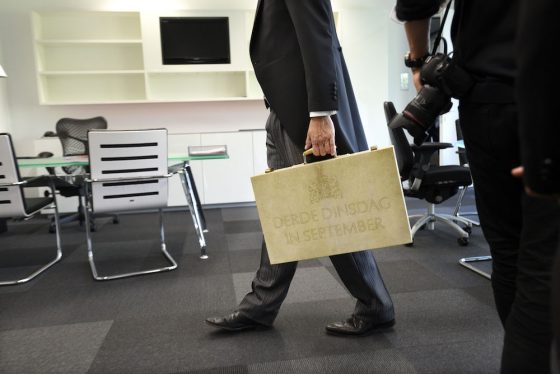The 2018 budget: we still have to wait to find out who will win

The king made his traditional speech and the finance minister presented the traditional suitcase to parliament. Gordon Darroch assesses the caretaker government’s spending plans for 2018.
Viewers of the television quiz show Who Wants To Be A Millionaire? will be familiar with the scene in which the presenter dangles a cheque for several thousand pounds under the contestant’s nose for a few seconds, then theatrically whisks it away and proclaims: ‘But we don’t want to give you that!’ Because there are bigger prizes still to be won.
This year’s Dutch budget felt a bit like that. For the first time in years the government has the luxury of money to spend: a €2.9bn budget surplus in 2017, predicted to soar past €10bn by 2021.
In the words of the king, the Netherlands currently boasts a ‘flourishing economy’ and ‘healthy coffers’. Yet the spending plans announced on Prinsjesdag were notably restrained. Opposition politicians complained of a missed opportunity to rebound from the years of austerity, but nobody was really surprised.
Convention
A new government is expected to take office within the next few weeks, and the outgoing caretaker administration is bound by the convention that it should refrain from making substantial policy decisions while its successor is being formed. There is also the new diktat of the houdbaarheidssaldo, which requires governments to future-proof their plans by calculating how much they need to keep back for long-term commitments such as healthcare. Once this has been factored in the amount left over is a more modest €1.7bn.
The outgoing coalition managed to secure the new team’s blessing for a number of small outlays: €435 mln for the elderly care sector, €270 mln to meet the pay demands of primary school teachers and €425 mln to ease the plight of pensioners and welfare dependents.
Low incomes
Politicians of all stripes agree that people at the lower end of the income scale should be the first to benefit after bearing the brunt of the recession, but the projected rise of 0.6% in disposable income is a small return on an economy growing by 3.3% a year. For many people rising living costs, from the price of apples to the new excess charge for health insurance of €400, will quickly swallow it up.
More money is also promised for healthcare, defence and tackling the challenges of climate change, but the details of these will have to wait until the new government takes office. For the same reason the annual budget debate (Algemene Politieke Beschouwingen) was postponed and will now be combined with the forthcoming debate on the new cabinet’s policy programme. Only then will we learn who will be getting the major prizes in 2018.
What was announced on Tuesday
- Total government income €285bn, total expenditure €277bn
- Budget surplus to reach 0.8% of GDP
- National debt to fall to 53.7% of GDP
- Economic growth will be 2.5%, compared with 3.3% this year
- On average people will have 0.6% more to spend, those in jobs will notice a 0.7% rise, those on benefits 0.3%.
- Unemployment will decline by 50,000 to 390,000
- €425m to repair spending power of pensioners and benefit claimants
- €160m extra spending on security and public safety
- €435m extra for nursing homes a year plus a further €130 for new staff
- €270m for primary school teacher’s pay
- €25m extra for the food safety board NWA
- €75m extra for the tax office to solve its organisational issues
- Own risk element in health insurance to rise from €385 to €400 a year
- Health benefits will rise by an average €130 a year
You can read more columns by Gordon Darroch on his blog Words for Press.
Thank you for donating to DutchNews.nl.
We could not provide the Dutch News service, and keep it free of charge, without the generous support of our readers. Your donations allow us to report on issues you tell us matter, and provide you with a summary of the most important Dutch news each day.
Make a donation